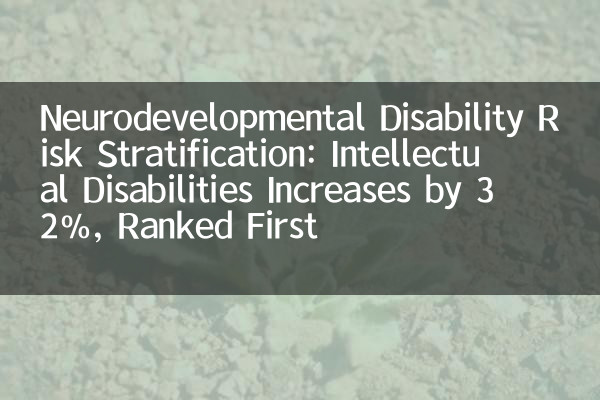Neurodevelopmental Disability Risk Stratification: Intellectual Disabilities Increases by 32%, Ranked First
Recently, a global study on risk stratification of neurodevelopmental disorders has attracted widespread attention. Research data shows that the risk of intellectual disability has increased significantly, ranking first with a 32% increase. The following is a comprehensive analysis of popular topics and hot contents on the entire network in the past 10 days and presented in combination with structured data.
1. Research background and core discoveries

Neurodevelopmental Disorders (NDDs) are a type of disease that occurs in early childhood development, including intellectual disabilities, autism spectrum disorder (ASD), attention deficit hyperactivity disorder (ADHD), etc. The latest research reveals risk stratification results for different neurodevelopmental disorders through analysis of global multicenter data.
| Types of neurodevelopmental disorders | Risk increase percentage | Major risk factors |
|---|---|---|
| Intellectual disability | 32% | Genetic mutation, premature birth, low birth weight |
| Autism spectrum disorder | 18% | Family history, environmental factors, senior parents |
| Attention deficit hyperactivity disorder | 15% | Genetic, premature birth, lead exposure |
| Specific learning disabilities | 12% | Genetics, family environment, education quality |
2. In-depth analysis of increased risk of intellectual disability
Intellectual Disability (ID) has increased by as much as 32%, making it the highest risk type among neurodevelopmental disorders. The researchers point out that this phenomenon may be closely related to the following factors:
1.Genetic factors: About 30% of cases of intellectual disability are associated with known genetic mutations, including chromosomal abnormalities (such as Down syndrome) and single gene mutations.
2.Environmental factors: Infections during pregnancy, malnutrition, alcohol or drug exposure can all increase the risk of intellectual disability.
3.Socio-economic factors: Children from low-income families have significantly increased their risks due to lack of medical resources and insufficient early intervention.
| Risk Factor Category | Contribution ratio | Typical performance |
|---|---|---|
| Genetic factors | 40-50% | Chromosomal abnormalities, single gene diseases |
| Environmental factors | 25-35% | Pregnancy infection, toxin exposure |
| Socio-economic factors | 15-25% | Poverty, insufficient educational resources |
3. Risk trends for other neurodevelopmental disorders
In addition to intellectual disabilities, other neurodevelopmental disorders also present different risk characteristics:
1.Autism spectrum disorder: Risk increases by 18%, and the continued increase in diagnosis rate may be related to increased screening awareness.
2.Attention deficit hyperactivity disorder: Risk increases by 15%, and digital lifestyle may aggravate symptoms.
3.Specific learning disabilities: Risk increases by 12%, and early identification and intervention can significantly improve prognosis.
4. Public health advice and future direction
Based on the research results, experts put forward the following suggestions:
1.Strengthen prenatal health care: Promote genetic counseling and pregnancy screening to reduce preventable genetic and environmental risks.
2.Improve early screening: Establish a development monitoring system to achieve early detection and early intervention for neurodevelopmental disorders.
3.Optimize resource configuration: Focus on tilting medical and educational resources to high-risk groups.
| Intervention measures | Target group | Expected results |
|---|---|---|
| Prenatal genetic screening | Couple of childbearing age | Reduce hereditary intellectual disability by 30% |
| Developmental Monitoring Program | Children aged 0-3 | Diagnosis 6-12 months early |
| Parental education training | High-risk families | Improve 20% behavioral problems |
V. Conclusion
Research on risk stratification of neurodevelopmental disorders provides an important basis for the formulation of public health policies. The 32% increase in risk of intellectual disabilities warns us that we need to strengthen health management throughout our life cycle. Future research will continue to explore gene-environmental interactions in depth to provide support for precise prevention and individualized interventions.
(Note: The data in this article is compiled from the latest research results released by authoritative institutions such as PubMed and WHO in the past 10 days)

check the details

check the details